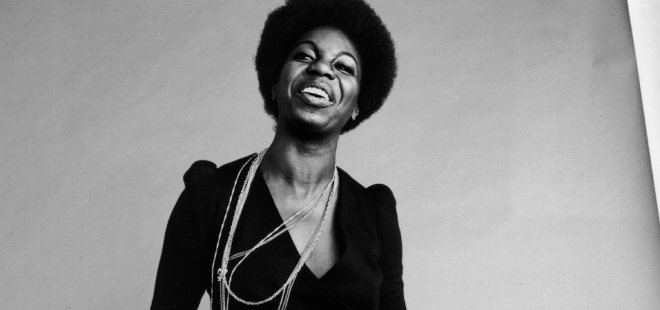
This week we recommend Claudia Roth Pierpont’s thoughts on the life of Nina Simone, “A Raised Voice,“ over at the currently open archives of The New Yorker.
As Roth Pierpont observes, controversy broke out earlier this year over the announcement of the selection of Zoe Saldana, “a movie star of Dominican descent and a light-skinned beauty along European lines,” to play Simone, “not only categorically African-American but specifically African in her features and in her very dark skin,” in a film about the singer. Pierpont traces this issue to the larger role that accepted ideas of beauty played in Simone’s life—not just as an African-American singer but as an African-American woman:
Singing in a club in Holland, in 1965, Nina Simone introduced a song she had written about what she called “Four Negro Women” to a young, homogeneously white, and transfixed crowd. “And one of the women’s hair,” she instructed, brushing her hand lightly across her own woolly Afro, “is like mine.”
Roth Pierpont offers a lively account of the troubled, fascinating Simone, from her discovery in the bars of Greenwich Village, to her friendship with Lorraine Hansberry, award-winning author of A Raisin in the Sun (of which Simone wrote, “We never talked about men or clothes…It was always Marx, Lenin and revolution—real girls’ talk.”); from Simone’s abusive marriage to her longtime manager, Andrew Stroud, to her skeptical views of the Civil Rights Movement (she introduced herself to Martin Luther King, Jr., with the warning, “I’m not nonviolent!”).
Throughout her piece Roth Pierpont explores the roots of what she sees as a righteous anger running throughout Simone’s public and private lives, heightened by her impatience with the advancement of the equal rights of African Americans. “As the sixties progressed,” Roth Pierpont writes, “the feelings she displayed—pain, lacerating anger, the desire to burn down whole cities in revenge—made her seem at times emotionally disturbed and at other times simply the most honest black woman in America.”
Read the article for yourself here, and just for good measure, check out this video of Simone performing “Four Girls” at the Harlem Cultural Festival in 1969.








